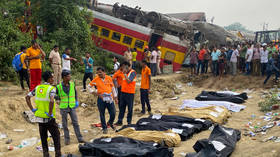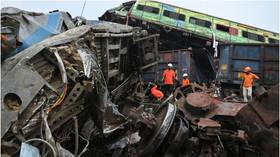Signal error caused deadly Indian train tragedy – report

A signal error led to the last month’s triple train collision that killed 293 people in the state of Odisha, India’s Ministry of Railways has said, in the first release of official findings from a probe into the deadly incident. The report concluded that if corrective measures had been taken after a similar failure in 2022, the tragedy could have been prevented.
The report by the Commissioner of railway safety, disclosed in response to questions raised by Dr John Brittas, a member of Rajya Sabha, the upper house of parliament, focused on signaling connections as the cause of the country’s worst train tragedy in over two decades. 41 bodies recovered from the site are still unidentified – while over 1000 passengers were injured.
The report detailed signaling circuit alteration lapses, and errors during the replacement of an electric lifting barrier which lead to a collision between the Kolkata-Chennai Coromandel Express, the Bengaluru-Howrah Superfast Express, and a stationary goods train, the report stated.
Earlier this month, India's Central Bureau of Investigation (CBI), the country’s top crime investigation agency, arrested three Indian Railways employees for alleged involvement in the lapses that led to the disaster. They were charged with culpable homicide not amounting to murder, and destruction of evidence. The accused are in judicial custody after their CBI remand period ended on July 15, and the next hearing on the case is slated for July 27.
The probe also shed light on a similar signal error that had occurred due to incorrect wiring and a cable fault at Bankranayabaz station in West Bengal on May 16, 2022. The CRS report said that if corrective measures had been taken after last year’s incident, the Balasore tragedy could have been prevented.
The Congress, India’s main opposition party, has hit out at Prime Minister Narendra Modi’s government following the release of the report’s findings. The party alleged that the Modi administration has “thoroughly compromised” on basic issues of railway safety, and that this “human error” exposes the failure of management and political leadership.
Top officials have been dismissed at Indian Railways in the wake of the tragedy, notably Archana Joshi, the General Manager of South Eastern Railway (SER), who was removed from her post, with Anil Kumar Mishra appointed as her successor.














